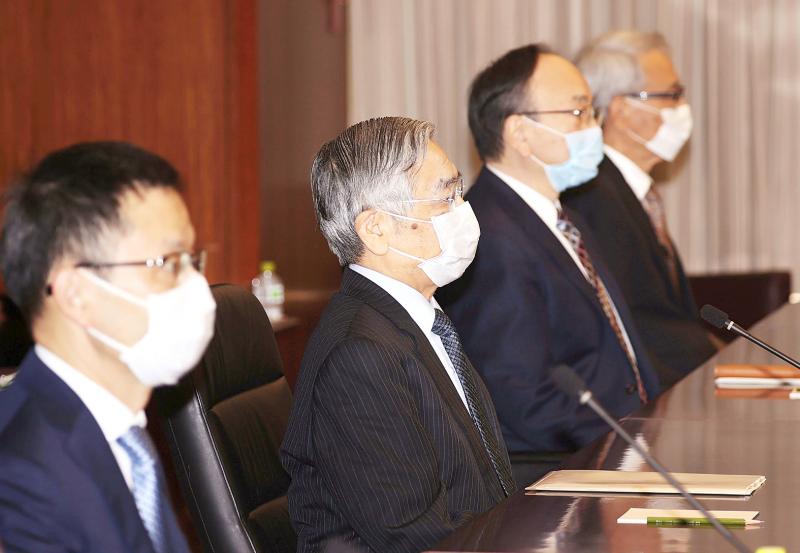The Bank of Japan (BOJ) cut its assessment of all nine of the nation’s regions in its quarterly “Sakura” report on local economies.
It was the first time since 2009 that the BOJ downgraded every region at once, another sign of the widespread damage the COVID-19 pandemic is doing to Japan and other countries.
Hours earlier BOJ Governor Haruhiko Kuroda sounded the alarm in a speech to the bank’s branch managers.

Photo: Reuters / Kyodo
“The spreading novel coronavirus is having a serious impact on our economy,” he told them, citing across-the-board weakness in exports, tourism, consumer spending and factory production. “The economic outlook is extremely uncertain.”
Responding to the recent jump in the nation’s infection numbers, Japanese Prime Minister Shinzo Abe this week was forced to declare a state of emergency for Tokyo, Osaka and prefectures, which together generate half of the nation’s economic output.
The governor of Aichi Prefecture yesterday called on the prime minister to add his province to the list of those in crisis.
“All nine regions revised down their assessments from the previous ones in January 2020, due mainly to the impact of the outbreak of the novel coronavirus and reported that their economy had been weak or facing strong downward pressure,” the BOJ said in its survey.
One respondent working at a Kyoto hotel said the number of visitors to the city was down sharply. The virus has hit the regional tourism industry harder than the global financial crisis, the person said.
Another person at a machinery maker on the island of Kyushu said business was being hampered by trouble in the supply chain.
The flow of parts from China still had not recovered, the person said, even though factories on the mainland are getting back to work.
The Bank of Japan next meets on April 27 and 28, when it is due to update quarterly economic projections.
The forecasts are likely to be dire, unless the BOJ skips making them as the US Federal Reserve did last month. Private sector economists now see Japan’s economy shrinking more than 10 percent this quarter.

China has claimed a breakthrough in developing homegrown chipmaking equipment, an important step in overcoming US sanctions designed to thwart Beijing’s semiconductor goals. State-linked organizations are advised to use a new laser-based immersion lithography machine with a resolution of 65 nanometers or better, the Chinese Ministry of Industry and Information Technology (MIIT) said in an announcement this month. Although the note does not specify the supplier, the spec marks a significant step up from the previous most advanced indigenous equipment — developed by Shanghai Micro Electronics Equipment Group Co (SMEE, 上海微電子) — which stood at about 90 nanometers. MIIT’s claimed advances last

ISSUES: Gogoro has been struggling with ballooning losses and was recently embroiled in alleged subsidy fraud, using Chinese-made components instead of locally made parts Gogoro Inc (睿能創意), the nation’s biggest electric scooter maker, yesterday said that its chairman and CEO Horace Luke (陸學森) has resigned amid chronic losses and probes into the company’s alleged involvement in subsidy fraud. The board of directors nominated Reuntex Group (潤泰集團) general counsel Tamon Tseng (曾夢達) as the company’s new chairman, Gogoro said in a statement. Ruentex is Gogoro’s biggest stakeholder. Gogoro Taiwan general manager Henry Chiang (姜家煒) is to serve as acting CEO during the interim period, the statement said. Luke’s departure came as a bombshell yesterday. As a company founder, he has played a key role in pushing for the

EUROPE ON HOLD: Among a flurry of announcements, Intel said it would postpone new factories in Germany and Poland, but remains committed to its US expansion Intel Corp chief executive officer Pat Gelsinger has landed Amazon.com Inc’s Amazon Web Services (AWS) as a customer for the company’s manufacturing business, potentially bringing work to new plants under construction in the US and boosting his efforts to turn around the embattled chipmaker. Intel and AWS are to coinvest in a custom semiconductor for artificial intelligence computing — what is known as a fabric chip — in a “multiyear, multibillion-dollar framework,” Intel said in a statement on Monday. The work would rely on Intel’s 18A process, an advanced chipmaking technology. Intel shares rose more than 8 percent in late trading after the

GLOBAL ECONOMY: Policymakers have a choice of a small 25 basis-point cut or a bold cut of 50 basis points, which would help the labor market, but might reignite inflation The US Federal Reserve is gearing up to announce its first interest rate cut in more than four years on Wednesday, with policymakers expected to debate how big a move to make less than two months before the US presidential election. Senior officials at the US central bank including Fed Chairman Jerome Powell have in recent weeks indicated that a rate cut is coming this month, as inflation eases toward the bank’s long-term target of two percent, and the labor market continues to cool. The Fed, which has a dual mandate from the US Congress to act independently to ensure